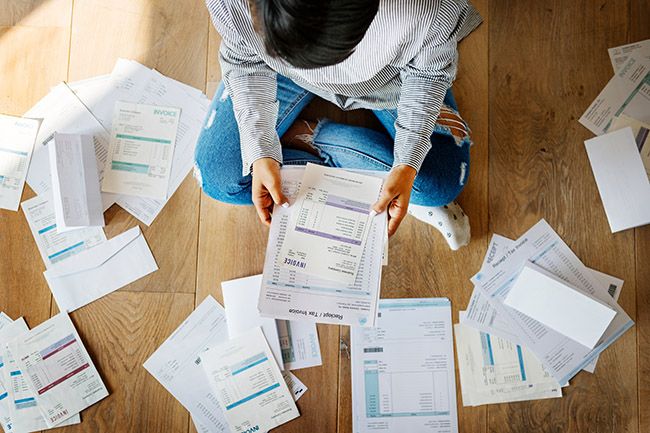Your options when you cannot make your payments
What are the options you have when you struggle to make your payments on a bad credit loan? First, you need to admit that there is a problem for yourself.
There is no doubt that you will be trying to think of as many different ways to repay as you can but sometimes that is not possible, despite your best efforts.
Remember that you are not alone. The Daily Mail reported recently that 28,000 people had contacted a debt charity to help them with payday loan debts.
Acknowledge your financial problem
When you acknowledge your financial problem, it is the start of putting things right. Just like if you are at work and you are not sure how to do something. You do not sit there and worry – you ask for help.
It is the same principle for borrowers when you are struggling with payments and you can’t repay your debt.
Lenders appreciate it when a borrower who cannot repay a loan gets in touch with them to tell them. If you acknowledge your financial problem and call the lender about it, they want to help.
You do not have to struggle on your own. When you acknowledge your financial position, it is good for you too. Talking with friends and family about your issues means that you do not have to carry the burden alone.
Let your creditor know that you are in financial difficulty
The first thing you should do is to let your creditor know that you are in financial difficulty. The minute you realise you are in too deep and you have taken on too much is the minute you should contact them.
If you have taken out finance and you do not let your creditor know you are in financial difficulty, they cannot help you. But may surprise you that there are certain rules and guidelines that they must follow.
Those rules and guidelines are in place to help when you struggle with payments and can’t repay your debt.
There are many ways you can let your creditor know that you are in financial difficulty. The lenders we spoke to suggested the best way to contact them was by phone.
It is much more personal than doing so by email, by online contact form, or by letter. You are there on the phone with a customer support worker who can relate to you on a one-on-one basis.
The customer support worker you speak to is part of a specially trained team. They work with customers every day who are struggling with payments.
What customer support workers are there to do is to help you plan. You will tell them that you cannot see how you can make the next repayment on your loan. Their job is to listen and, work with you on a plan to repay your loan without causing you further hardship.

How your lender may help you to resolve your debt
As we mentioned earlier, there are many ways your lender may help you to resolve your debt.
There are three key ways you should expect to hear, which we cover next.
Put a 30-day hold on your account
Many short term credit providers will initially offer to put a 30-day hold on your account.
If they do put a 30-day hold on your account, you get extra breathing room as a borrower. If you have taken out a payday loan, that is an extra 30 days to find the money you need.
What if you have taken out short-term finance to repay over 2-12 months? Then, they may move your repayment dates back an extra 30 days. This is so you have a chance to recover financially before resuming your repayments.
When a lender chooses to put a 30-day hold on your account, they will not call you demanding repayment.
Extend your repayments for longer
For borrowers facing difficult situations, your lender may extend your repayments for longer. If you have a loan until payday, this may mean paying back over two or three smaller instalments. Customers with short-term loans may have their repayments extended for longer.
Here is an example.
You might have borrowed £500 for over 6 months.
If your lender offers to extend your repayments, they might extend the loan to 9 months instead. Please be aware that if this is the case, they may charge more interest and a default fee.
Freeze your interest
Each lender is different and if they do give you longer to repay your loan, many may freeze your interest.
When a lender makes a decision to freeze your interest, no extra charges will mount up. Your lender recognises that you are in trouble and they do not wish to add to it. They recognise that you want to pay them back and they are happy to give you the room to do that.
What if a borrower loses their job and there is no guarantee when they will be paid? Lenders allow you to make small gesture payments until your finances are back on track.
When speaking to your customer support worker, explore every option and never be afraid to ask questions.
Understand your rights and responsibilities before you contact a lender
The Financial Conduct Authority governs all loan companies in the UK. Each lender and broker needs a license before they can offer finance. If you know the rules they must follow, you can understand your rights before you contact them.
When you do understand your rights you are better prepared to deal with your customer support worker. This can help you try to achieve the best and most manageable outcome for you.
Lender responsibilities when they approve a high cost credit loan
Because of the FCA’s rules, there are specific responsibilities for lenders when approving personal finance. Each lender has to follow these rules to keep their licence and to operate lawfully.
The three major rules are that:
- They cannot charge more than 0.8% interest a day (that is £24 for every £100 you borrow)
- Lenders should never charge more in interest fees than the amount borrowed. So, if you borrowed £500, you will never pay back more than £500 in interest and fees on top of the £500 you took out
- A lender is not allowed to charge you a default fee of higher than £15. You may have to pay a default fee if you miss a repayment date, for example.
The reason why these are in place is to ensure that money is only lent to people who can afford to repay it.
Lenders’ responsibilities when you struggle with repayments
There is a different set of lender responsibilities when you struggle with repayments.
If you cannot make repayments on your loan, it is a stressful time. When you struggle with repayments, the rules are there to protect you.
The main rules you need to know are that:
- Your lender must point you in the direction of independent and free debt counselling and advice services
- They must not try to collect the debt while you’re working out how to repay it. You can work out how to do that on your own or you can get help to do it
- They must treat you fairly and give you a reasonable length of time to repay the loan
- They should not make multiple attempts to contact you
- They must consider an offer to make small payments as a gesture of your good will. And those small payments must not make paying your normal bills harder
When you applied, you would have agreed that your repayments would come from your bank account by something called a Continuous Payment Authority (CPA). If your lender tries unsuccessfully to take payment using CPA twice, legally they are not allowed to try again.
You can cancel your CPA if you are trying to protect the money that remains in your account. You will need to contact your bank to do so. It is always best to contact your lender to let them know that you have done this.
Please be aware that your debt to the lender will still be outstanding if you cancel the CPA.
Points of contact when you find yourself in unmanageable debt
There are many advisors and professionals you can go to. But choosing the best points of contact depends on:
- The type of debt you have
- The amount of money you owe
- Your individual circumstances.
If you fall behind on your repayments, your lender will direct you to one of the debt advice services.
Debt advice staff will tell you about the number of ways you can manage debt that has become too much for you. They will even contact lenders and negotiate repayment of the debt on your behalf.
Their goal is to reduce the amount you’re paying out each month to take some of the pressure off.
Here are some websites for advice services you can contact for help:
If your debt is large and spread over many accounts, you could consider the following:
- An Individual Voluntary Arrangement
- a Debt Relief Order (not in Scotland)
- or bankruptcy.
How to always keep up with your loan repayments
There are steps you can take to help you keep up with your loan repayments. Sometimes, this will be enough to prevent you from falling behind on repayments. Despite your best efforts, you may still struggle at times after taking these steps.
Creating a monthly budget should form part of any plan on how to always keep up with your loan repayments. Log on to your online bank and check to see how much money you are being paid each month and how you are spending it.
You may want to consider switching to cheaper insurance and utility providers. Or downgrading your television subscription.
Instead of buying a coffee from Starbucks first thing in the morning, you might find £15-20 a week in savings by making your own coffee.
Ideally, you should do this before taking out a loan. You may find that over time you can build up a savings fund to cope with emergency situations.
If you still need to take a loan out, you should be clear on how to always keep up with your loan repayments. If you are not sure you can repay a loan, you should not take one out as this will only increase your problems later on.

Summary
Finding yourself unable to repay a loan is a stressful situation. No-one likes being chased for money they cannot afford to repay.
It is always better to confront this situation head-on. Be proactive and get in touch with your lender as soon as you realise you are going to have a problem.

